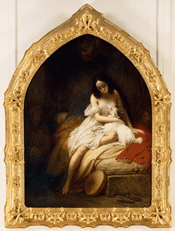
01 Sep 2010
BERTIN: La Esmeralda
La Esmeralda: Opéra in four acts.
Mozart and Salieri, an opera in one act consisting of two scenes.
Nicolai Rimsky-Korsakov (1844-1908), composer. Libretto derived from Alexander Puskhin's play of the same name.
First performance: 7 December 1898 in Moscow.
Ariadne auf Naxos, Oper with a prologue and one act. Music composed by Richard Strauss. Libretto by Hugo von Hofmannsthal.
La Vestale, a tragédie lyrique in three acts.
Boris Godunov, an opera in four acts with prologue
Modest Mussorgsky, composer. Libretto by the composer, based on Alexander Pushkin's drama Boris Godunov and Nikolai Karamazin's History of the Russian Empire
First performance: 8 February 1874 at the Mariinsky Theatre, St. Petersburg
Il Trovatore, dramma in four parts.
Only a few months following the premiere of Der Rosenkavalier, Hugo von Hofmannsthal proposed a new opera to Richard Strauss based on Molière’s comedy-ballet, Le Bourgeois gentilhomme (in German, Der Bürger als Edelmann).
Die Entführung aus dem Serail, Singspiel in 3 Acts.
Music composed by Wolfgang Amadeus Mozart (1756–1791). Libretto by Johann Gottlieb Stephanie the Younger, based on an earlier libretto by
Christoph Friedrich Bretzner.
Die Entführung aus dem Serail, Singspiel in 3 Acts.
Music composed by Wolfgang Amadeus Mozart (1756–1791). Libretto by Johann Gottlieb Stephanie the Younger, based on an earlier libretto by
Christoph Friedrich Bretzner.
Arabella: Lyrische Komödie in three acts
Die Entführung aus dem Serail, Singspiel in 3 Acts.
Music composed by Wolfgang Amadeus Mozart (1756–1791). Libretto by Johann Gottlieb Stephanie the Younger, based on an earlier libretto by
Christoph Friedrich Bretzner.
La Gioconda, dramma lirico in four acts.
Music composed by Amilcare Ponchielli (1834–1886). Libretto by Arrigo Boito (under the pseudonym Tobia Gorrio), based upon Victor Hugo's Angelo, Tyrant of Padua (1835).
Don Carlo, an opera in four acts. Music composed by Giuseppe Verdi (1813–1901). Libretto by Joseph Méry and Camille Du Locle after Friedrich von Schiller’s dramatic poem Don Carlos, Infant von Spanien. Revised version in four acts (French text revised by Du Locle, Italian translation by Achille de Lauzières and Angelo Zanardini).
Un ballo in maschera, a melodramma in three acts.
Music composed by Giuseppe Verdi. Libretto by Antonio Somma, based upon the work of Eugène Scribe Gustave III ou Le bal masqué (1833)
Medea: Melodramma tragico in three acts.
Die Tote Stadt, an opera in three acts.
Music composed by Erich Wolfgang Korngold (1897-1957). Libretto by Paul Schott (Julius and E. W. Korngold) after the novel Bruges la morte by Georges Rodenbach.
Some Details concerning the Revolution inaugurated by Rossini
Manon Lescaut, dramma lirico in quattro atti
Elektra: Tragedy in one act.
Lyric Opera of Chicago has announced both schedules and cast-lists for is Spring 2020 performances of Richard Wagner’s Ring Cycle. Given the series of individual productions already staged by the company since Fall 2016, that pave the way for the complete cycle, Lyric Opera of Chicago’s complete production should affirm the artistic might of the great composer.
“Diacono himself does not know what musical talent he possesses” – Mascagni

La Esmeralda: Opéra in four acts.
Streaming Audio
Music composed by Louise Bertin. Libretto by Victor Hugo from his novel Notre-Dame de Paris (Hunchback of Notre Dame). Vocal score edited by Franz Liszt (Cat. Nos. LW A038a and S 476)
First Performance: Opéra, Paris, 14 November 1836
| Principal Roles: | |
| La Esmeralda | Soprano |
| Phoebus | Tenor |
| Frollo | Bass |
| Quasimodo | Bass |
| Clopin | Tenor |
| Fleur-de-Lys | Mezzo-Soprano |
| Le Vicomte de Gif | Tenor |
| Madame de Gondelaurier | Mezzo-Soprano |
| Monsieur de Morlaix | Baritone |
| Monsieur de Chevreuse | Bass |
| Diane | Mezzo-Soprano |
| Berangere | Mezzo-Soprano |
| Pierrat Torterue | Baritone |
Synopsis of novel:
The story dates back to January 6, 1482 in Paris, France, the day of the ‘Festival of Fools’ in Paris. Quasimodo, the deformed bell-ringer of Notre Dame, is introduced by his crowning as Pope of Fools.
Esmeralda, a beautiful Gypsy with a kind and generous heart, captures the hearts of many men, including that of a Captain Phoebus, but especially those of Quasimodo and his adopted father, Claude Frollo, the Archdeacon of Notre Dame. Frollo is torn between his lust and the rules of the church. He orders Quasimodo to kidnap her, but the hunchback is suddenly captured by Phoebus and his guards who save Esmeralda. Quasimodo is sentenced to be whipped and ordered to be tied down by the heat. Esmeralda, seeing his thirst, offers him water. It saves her, for she captures his heart.
Esmeralda is later charged with the attempted murder of Phoebus, whom Frollo attempted to kill in jealousy, and is sentenced to death by hanging. As she is being led to the gallows, Quasimodo swings down by the bell rope of Notre Dame and carries her off to the cathedral under the law of sanctuary. Clopin rallies the Truands (criminals of Paris) to charge the cathedral and rescue Esmeralda. The King, seeing the chaos, vetoes the law of sanctuary and commands his troops to take Esmeralda out and kill her. When Quasimodo sees the Truands, he assumes they are there to hurt Esmeralda, so he drives them off. Frollo betrays Esmeralda by handing her to the troops and watches while she is hanged. Quasimodo pushes him from the heights of Notre Dame to his death. Quasimodo then goes to a mass grave, lies next to her corpse, crawls off to Esmeralda’s tomb with his arms around her body and eventually dies of starvation. Two years later, excavationists find the skeletons of Esmeralda with a broken neck and Quasimodo locked in an embrace.
[Source: Wikipedia]
Libretto not available.